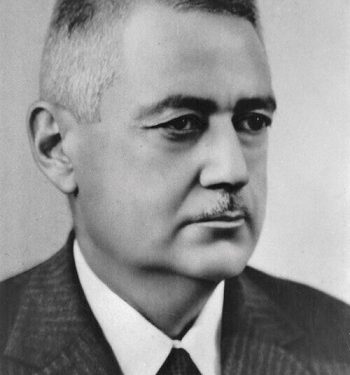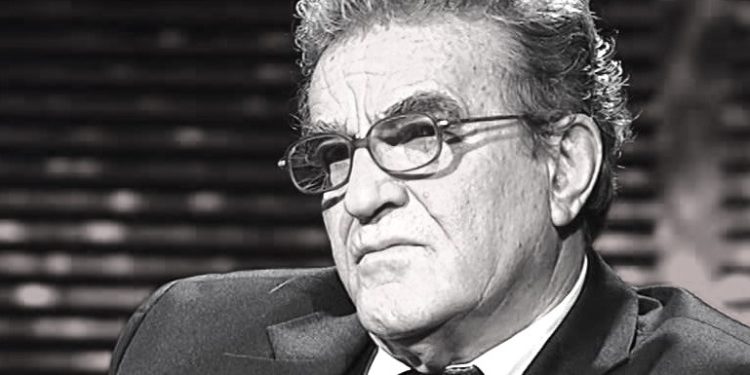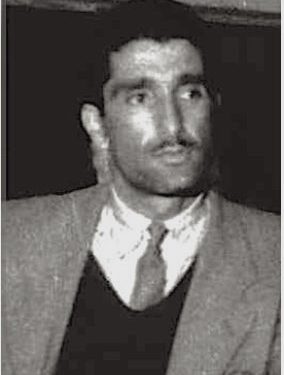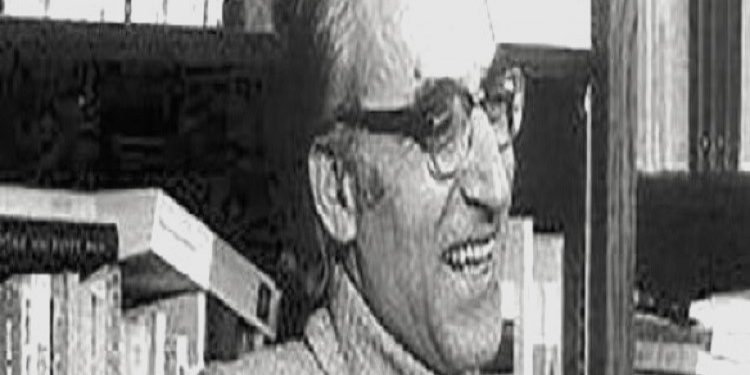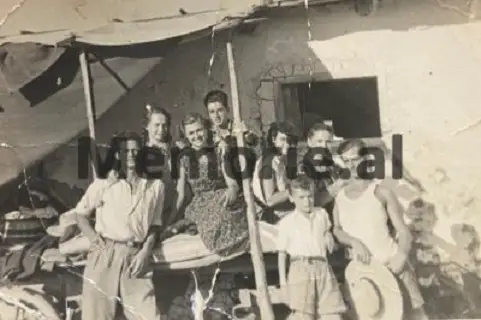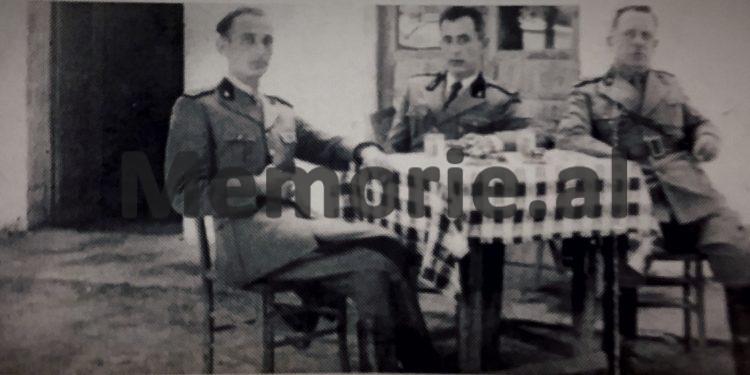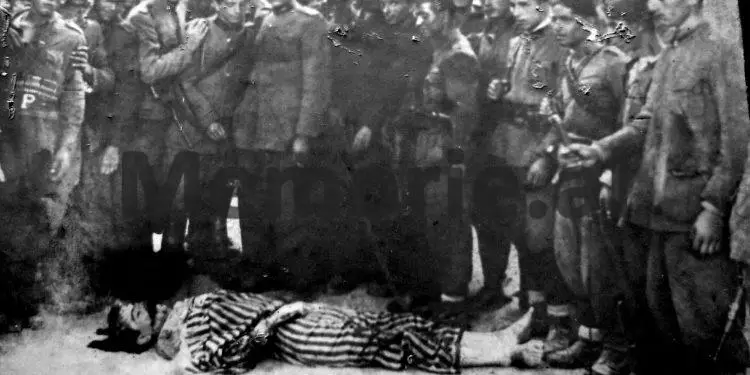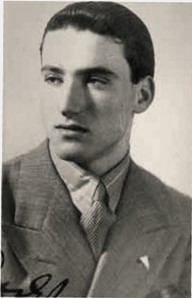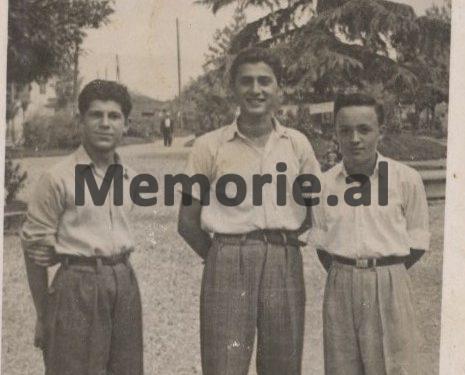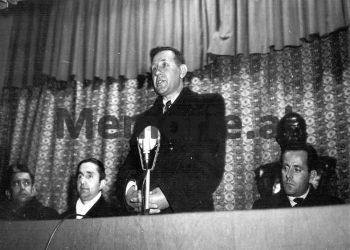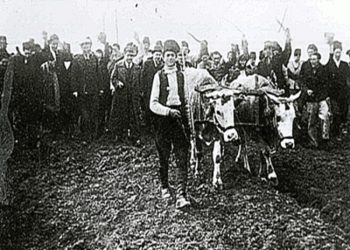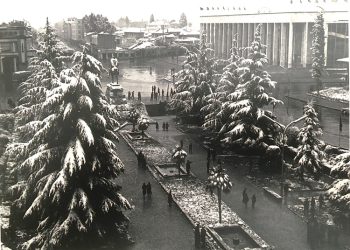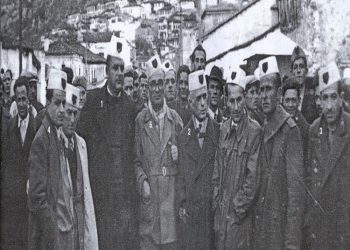By Uran BUTKA
Memorie.al The totalitarian regime essentially attacked true culture and art, to create a culture and a tendentious, ideologized art, to raise the anthem to the red pashalars, as happened with the class works of socialist realism. The Pipa family, one of the most cultured and anti-conformist families in Albania, was punished because it did not side with the communist regime. Mustafa Pipa, a well-known lawyer, was a member of the Court of Dictation, when this court was independent, during the time of Zog. Myzafer Pipa, the son, trained for justice in Padua, shone as a champion of culture (he directed the cultural magazine “Fryma”), of patriotism (as an anti-fascist, he was exiled by the fascists in Ventotene and by the Nazis in the Pristina camp) and especially of sublime justice.
He defended with unprecedented courage the innocent nationalists, democrats and clerics who were convicted by military courts in 1945-46, publicly opposing Koçi Xoxe, Aran Çela, etc., but was arrested and tortured using barbaric methods against him, such as irons red-hot in the fire, with which they pierced his body to the bone, until he died in torture. His brother, Arshi Pipa, who had a doctorate in philosophy in Florence, a teacher in high schools in Tirana and Durrës, did not agree with the Stalinist regime and the conformist socialist-realist culture.
He was arrested for his links to the Postriba Movement and was imprisoned in prisons and extermination camps such as Burrel, Vloçisht, etc., which he described in the work “The Prison Book”. In 1957, he escaped from Albania. Professor of philosophy and literature at some of the most renowned universities in America, Arshi Pipa, was distinguished for his creativity and scientific studies in the fields of literary criticism, Albanian and world language and literature, politics, sociology, journalism, etc. Although far from his country, he was seen by the communist regime as a dangerous enemy, and even the Prime Minister of Albania, Mehmet Shehu, was eliminated because, according to Enver Hoxha’s accusation, “he married Arshi Pipa’s niece!”
The blind process of primitive revenge, of annihilation and alienation, primarily functioned against prominent noble and bourgeois families, who supported and were included in the ranks of the National Front, Legality, or the Northern Leaders. Large families; Lepenica, Muço, Dosti, Golemi, Ermenji, Quku, Hekali, Fratari, Cfiri, Bushati, Cakrani, Pali, Petrela and many others were punished because they were connected to the ‘National Front’; the Kupi, Çoba, Luli, Allamani, Mena families, etc. because they were legal and so on. For example, the head of the Kazazi family, Halit Kazazi, a nationalist and anti-communist, was shot without trial by communist terrorists. Jup Kazazi, who graduated in political science in Italy, resigned as minister of fascism and fought against the Italians in the battle of Reç, August 1943.
The main leader of the anti-communist resistance of Postriba, he committed suicide, surrounded in 1946, to avoid falling into the hands of the communist rulers. His brother, Seit Kazazi, was also killed, also a law graduate, former commander of the “Besnik Çano” ballistic battalion, who fought in Kosovo, where the fighter of this battalion, Hamit Troplini, also fell martyr. The other brothers, Zenel and Hamid Kazazi, were sentenced to heavy imprisonment. As if that wasn’t enough, the communists shot their uncle, Abdulla Kazazi, and their uncle, Rifat Kopliku, without trial. Rasim Kazazi died from torture in his cell. Cousins Sabri, Bektesh, and Bexhet Kazazi were sent to prison. The entire Kazazi family was persecuted, dispossessed, and their children were deprived of their schools.
This tragic fate was also suffered by the families who refused to join the NC Front, which was nothing more than the disguised KP. The family of Muharrem Bajraktari, although it refused to join the Communist Front, fought against the Italians, the Germans, and the Communists. But it suffered a tragic fate. Muharrem Bajraktari himself, after resisting with weapons until 1946, escaped from Albania, while his brother, Bajrami, wounded in the attempt, was imprisoned and shot. The Kryeziu family of Gjakova, with Gani, Hasan, and Said Kryeziu, collaborated with the National Liberation Movement, without joining the Front.
But it was hit and destroyed by the National Liberation Forces of Albania and at the same time by the National Liberation Forces of Kosovo, when the Kryeziu fought against the Germans to liberate Gjakova. From the famous Gashi tribe of Tropoja, Ramë Muja was especially distinguished, who formed one of the first anti-fascist detachments in Albania, but the communists caused him three deaths at once: they poisoned him with the help of a woman, then they took him dead to an ambush and shot him with a gun, to show that they killed him in an attempt and not through treachery, then they hung him on a rope in old Tropoja.
The same thing happened with the great warrior families of Preng Cali from Kelmendi, Mehmet Ali Bajraktar from Hasi, Ymer Bardhoshi from Puka, Ndue Pal from Dukagjini, Llazar Fundo from Korça and other families who helped and shed the blood of their sons in the patriotic war against the Serbian, Italian and German invaders, but who did not join the Communist Front, according to the totalitarian slogan: “Either with us, or against us”. Communism shot, imprisoned, and exiled the prominent heads of these old Albanian families, who had defended their homeland and freedom for generations, while interning the women and children in the camps of Tepelena, Vloçisht, etc.
And, if it did not spare these patriotic and anti-fascist families, the regime proved merciless towards the families of those people who had collaborated with the Italians or the Germans, such as; Shefqet Vërlaci, Gjon Markagjoni, Mustafa Kruja, Kolë Bib Miraka, Halil Alia, Hysni Dema, Prenk Previzi, Vizhdan Risilia, Kadri Cakranit, etc. Of course, collaborationism is morally and legally condemnable at all times, but responsibility is personal. But communism generalized this as a phenomenon and for one person, it punished a family with all its innocent children generation after generation, persecuted and stained a tribe, a province, an organization or a party, even Kosovo, for collaborationism. This anti-human and anti-national policy served the unlimited power of the Albanian communists, but also Yugoslav interests in Albania and Kosovo.
The peak of the communist government’s feverish activities to annihilate the Albanian right, which also included noble families, was the creation and functioning, from the end of 1944 onwards, of military courts, a Russian-Yugoslav experience. The Special Court of Tirana alone, from March 1 to April 13, 1945, tried in 31 sessions, 60 nationalist intellectuals from prominent pro-Western families. After the war, the few noble families that had joined the National Liberation Front, remembering that they were fighting for a democratic Albania, were gradually eliminated.
A good part of them were integrated into the democratic opposition groups, due to their different opinions, but also as a reaction against the establishment of the communist dictatorship in Albania. However, opposition was not allowed, because those who acted outside the National Liberation Front were considered enemies and were immediately annihilated. Deputy Gjergj Kokoshi, a doctorate holder at the University of Paris, a great patriot and democrat, who had put everything into the National Liberation War, the first Minister of Education after the war, declaring that; “where there is no pluralism, there is no democracy”, ended up dead in Burrel prison, while 37 opposition figures from large families, such as; Suat Asllani, Sami Qeribashi, Qenan Dibra, Musine Kokalari, etc., were shot and imprisoned. Musineja, from the prominent Kokalari family, the first Albanian writer, an intellectual with a broad democratic culture and vision, graduated in the West for Arts, founder of the Social Democratic Party (October 1943), publisher of the newspaper “Zëri i Lirisë”, declared in court:
“I am not guilty. I am not a communist and this cannot be called a crime. You won the elections, but I should not be in prison. I am Sami Frashëri’s student. With me you want to condemn the Renaissance…”! The “Opposition Group of Deputies”, which had its beginnings in February 1945, also suffered this fate. “The current regime of Albania is a totalitarian regime and is not suitable for our country for this reason. I think that a regime in the form of Western democracy would have been suitable for Albania”, – declared in court Shefqet Beja, whom the communists hanged with a rope.
Sheh Ibrahim Karbunara, a patriot and a cultured cleric, a signatory of the Independence, an organizer and delegate to the Congress of Lushnja, a supporter of the anti-fascist war and an opposition MP, was shot along with his son Hyseni and his family was persecuted. The prominent intellectual, scientist and MP Selaudin Toto, the founder of the Institute of Sciences in Albania, and translator of Edith Durham, was also executed.
The class struggle was growing and achieving tremendous success. The state machinery was working with blood. Enemies, Anglo-American agents, and saboteurs were being invented. Engineers Abdyl Sharra and Kujtim Beqiri, from prominent families in Vlora, were hanged, as were the well-known engineers Sulo Klosi and Riza Alizoti, from families with history.
Those suckers of well-known families who survived the genocide of the first post-war years were annihilated throughout the entire socialist period. The culmination of this “holocaust” is the massacre under the pretext of the bomb at the Soviet embassy. Intellectuals who had no connection to this incident were shot without trial or guilt, such as Sabiha Kasimati, one of the most prominent women in Albania, the first Albanian scientist, Pjerin Guraziu, Jonuz Kaceli who was killed in the interrogation, Zyhdi Herri, Manush Peshkëpia, Reiz Selfo and Tefik Shehu from Gjakova, Anton Delhysa from Prizren, Mehmet Shkupi, Gafur and Myftar Jegeni and Haki Kodra from Dibra e Madhe and others, and were buried at midnight, tied with barbed wire, in a common grave near the Beshirit Bridge.
I will dwell briefly on the Jegeni family, which contributed to the Albanian League of Prizren, to the Dibra assemblies and to the fight for the defense of Albanian lands with Shaqir beg Jegeni, Tefik beg Jegeni and Riza beg Jegeni. From this family, two other prominent figures later emerged, Gafur and Myftar Jegeni, academics with studies completed in Italy, soldiers of the National Army, who fought on April 7, 1939 against the fascist occupation, Gafurri in Vlora and Myftari in Durrës with Abaz Kupi. After the war, they withdrew into private life, because they did not want to serve the communist regime.
They were both arrested and shot without trial in 1951 along with 22 other intellectuals and their families were interned for 40 years. The absurdity of the communist persecution was that, in addition to their families, all the other families of the Jegeni tribe were also interned, thanks to the zeal of their son-in-law, Haxhi Lleshi. In 1976, the President of the Republic, Haxhi Lleshi, interned his wife Haxhire Lleshi (Jegeni) in Mollas after 40 years of marriage, along with their son Rushiti, as well as his wife’s brothers and cousins, thus setting a typical Stalinist example of how class warfare should be waged in Albania!
Large families were deprived of their lives, their dignity, but also of their properties, which were illegally seized and nationalized, even their villas and houses, where the “red pashas” were placed. The suffering and humiliation in communist prisons was a shameful and horrific page, it is enough to remember Burrel, where the most prominent men of the nation tragically ended; Spaçi, where the greatest revolt of political prisoners broke out, from which four martyrs were shot: Pal Zefi, Dervish Bejko, Hajri Pashaj and Skënder Daja, from well-known families, and hundreds of others were re-convicted; Vloçisht (let us remember the bloody self-sacrifice of Sulejman Vuçiterna and the walling of the helpless on the embankment of the prisoners’ canal), the Tepelena camp (I can’t get the patched shirt of Genc, Muharrem Bajraktar’s son, out of my mind.
We were in a class in Tepelena, he came to school in the height of winter barefoot, with his socks and only a shirt with patches all over it, sewn with his mother’s hair) and other prisons, where the most illegal tortures were applied and where many people from large families lost their lives in slave labor, whose graves are still unknown today. In prisons, the sentences “for agitation and propaganda” (!), were re-applied, so that the convicts from these families would not come out alive. Xhelal Koprencka, from the prominent Koprencka family of Skrapar, was re-convicted five times and finally shot. About 12 types of inhuman torture were applied. Myzafer Pipa’s body was pierced with a red-hot iron until the iron touched the bone, until he died, while Drita Kosturi had her teeth and hair knocked out by the use of electric shocks and other monstrous crimes.
The monstrous class war particularly hit the prominent families branded as reactionary. The class hatred towards them and their completely innocent generations took on the proportions of the rage of wolves, as Mid’hat Frashëri puts it. Any relationship, even amorous, between young people of different class affiliations was punished. The most typical, but also the most sensational case, was the attitude towards Prime Minister Mehmet Shehu himself, when his son became engaged to a girl from the prominent Turdiu family. Not only was this relationship violently broken, but the prime minister paid for it with suicide or murder, while his wife was imprisoned and died there from torture. A lesson for everyone else!
Children of large families were deprived of higher education, civil service, art, even sports, and the regular army, except in labor units. Remember those talented people from our class who once shone in high schools, who for a gesture, a word, or a verse, even for nothing, were expelled from school or imprisoned, like; Bilal Xhaferi, Pjetër Arbnori, Visar Zhiti, Sherif Merdani, Maks Velo and hundreds of others, ending with the poets of Bërzeshtë, Vilson Blloshmi and Genc Lekë who were shot for some lyrical verses in the 1970s, as well as the teacher and exiled poet Avzi Nelaj, whom the dictatorship, under the signature of Ramiz Ali, hung from a rope in the days when she was giving up her life. If that wasn’t enough, they buried her vertically in a deep pit and stuck a high-voltage concrete pole above the corpse, so that not even a mole could be found!
The communist regime also put pseudoscience to work, as in all the countries of the Evil Empire. The role of inheritance, genes, and tradition was denied, the subject of genetics was removed from schools, and noble families and their heirs were slain to make way for a caste of subjugated, ignorant people. Instead of natural evolution, violent revolution was raised to a cult, instead of reason, the guillotine was raised, instead of citizenship, blind obedience was established.
Dr. Mentor Petrela, one of the scions of Tirana’s prominent families, told me that an American scientist, studying the DNA of the Tsar of Russia, executed by the Bolsheviks, concluded that it would take today’s Russians about 150 years to reach the level of the Tsar’s DNA. The blow and polishing that was inflicted on the brain of our nation by communism, as well as the unnatural half-century-long interruption of genes, brought incalculable damage to Albanian being and life, not only at that time, but also today. This is best evidenced by the difficult and traumatic transitions of these years of democracy, where a non-noble and non-civilized mindset and mind, idiolatry and false idols, come from nothing, have dominated.
The reason is that communism destroyed the system of moral and civic values elaborated over centuries and a system of values on which today’s life and civilization function has not been established. We are in an existential crisis of values, which the individual and our society need to be cohesive, healthy and balanced within themselves and integrated outside of them. The system of human values orients and saturates individual and social life, helps the Albanian man to become a noble and civic person and protects society from today’s moral and spiritual destruction.
Because we are heading carelessly, towards a moral desert, where arbitrariness, moral depravity, abuse of power, illegal profit and Rasputinism are dominating. The moral deformation of today’s Albanian life comes from the blow and abandonment that was made to the traditional system of human values, but also from today’s lack of effort to gradually make possible a common system of values related to humanism, Albanian identity, mutual respect, solidarity, tolerance, altruism, moral ethics, cooperation, fair competition, correctness towards the rule of law, etc., such prominent traits of personalities and large families. Memorie.al




